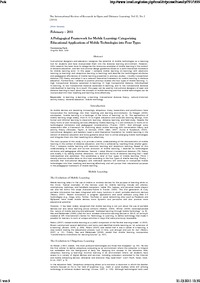A Pedagogical Framework for Mobile LearningCategorizing Educational Applications of Mobile Technologies into Four Types
Yeonjeong Park
Erstpublikation in: IRRODL, Vol 12, 2 (2011)
Publikationsdatum:
|
 |
 Diese Seite wurde seit 6 Jahren inhaltlich nicht mehr aktualisiert.
Unter Umständen ist sie nicht mehr aktuell.
Diese Seite wurde seit 6 Jahren inhaltlich nicht mehr aktualisiert.
Unter Umständen ist sie nicht mehr aktuell.
 Zusammenfassungen
Zusammenfassungen
Instructional designers and educators recognize the potential of mobile technologies as a learning tool for students and have incorporated them into the distance learning environment. However, little research has been done to categorize the numerous examples of mobile learning in the context of distance education, and few instructional design guidelines based on a solid theoretical framework for mobile learning exist. In this paper I compare mobile learning (m-learning) with electronic learning (e-learning) and ubiquitous learning (u-learning) and describe the technological attributes and pedagogical affordances of mobile learning presented in previous studies. I modify transactional distance (TD) theory and adopt it as a relevant theoretical framework for mobile learning in distance education. Furthermore, I attempt to position previous studies into four types of mobile learning: 1) high transactional distance socialized m-learning, 2) high transactional distance individualized m-learning, 3) low transactional distance socialized m-learning, and 4) low transactional distance individualized m-learning. As a result, this paper can be used by instructional designers of open and distance learning to learn about the concepts of mobile learning and how mobile technologies can be incorporated into their teaching and learning more effectively.
Von Yeonjeong Park im Text A Pedagogical Framework for Mobile Learning (2011) Instructional designers and educators recognize the potential of mobile technologies as a learning tool for students and have incorporated them into the distance learning environment. However, little research has been done to categorize the numerous examples of mobile learning in the context of distance education, and few instructional design guidelines based on a solid theoretical framework for mobile learning exist. In this paper I compare mobile learning (m-learning) with electronic learning (e-learning) and ubiquitous learning (u-learning) and describe the technological attributes and pedagogical affordances of mobile learning presented in previous studies. I modify transactional distance (TD) theory and adopt it as a relevant theoretical framework for mobile learning in distance education. Furthermore, I attempt to position previous studies into four types of mobile learning:
Von Yeonjeong Park im Text A Pedagogical Framework for Mobile Learning (2011) - high transactional distance socialized m-learning,
- high transactional distance individualized m-learning,
- low transactional distance socialized m-learning, and
- low transactional distance individualized m-learning.
 Dieser Text erwähnt ...
Dieser Text erwähnt ...
 Personen KB IB clear | William G. Anderson , Henry Jenkins , Eric Klopfer , Agnes Kukulska-Hulme , Jun Li , Heidy Maldonado , Joel A. Michael , Michael Grahame Moore , Roy Pea , Jeremy Roschelle , Allen A. Rovick , Mike Sharples , Kurt Squire , Josie Taylor , John Traxler , Giasemi Vavoula , Lew Semjonowitsch Vygotsky , Kevin Walker , Mark Weiser , Niall Winters | ||||||||||||||||||||||||||||||||||||||||||||||||||||||||||||||||||||||||||||||||||||||||||||||||||||||||||||
 Begriffe KB IB clear |  distance learning / Fernunterricht distance learning / Fernunterricht distance learning
, distance learning
,  Lernen Lernen learning
, Lernen zu Lernenlearning to learn
, learning
, Lernen zu Lernenlearning to learn
,  mobile learning mobile learning mobile learning mobile learning
| ||||||||||||||||||||||||||||||||||||||||||||||||||||||||||||||||||||||||||||||||||||||||||||||||||||||||||||
 Bücher |
| ||||||||||||||||||||||||||||||||||||||||||||||||||||||||||||||||||||||||||||||||||||||||||||||||||||||||||||
 Texte |
|
 Zitationsgraph
Zitationsgraph
 Zitationsgraph (Beta-Test mit vis.js)
Zitationsgraph (Beta-Test mit vis.js)
 Zeitleiste
Zeitleiste
 2 Erwähnungen
2 Erwähnungen 
- Mobile Inquiry-Based Learning with Sensor-Data in the School - Effects on Student Motivation (Olga Firssova, Marco Kalz, Dirk Börner, Fleur Prinsen, Ellen Rusman, Stefaan Ternier, Marcus Specht) (2014)


- Handbuch Mobile Learning (Claudia de Witt, Christina Gloerfeld) (2018)


- 3. Veränderungen in der Didaktik durch Mobile Learning (Ilona Buchem)


- 3. Veränderungen in der Didaktik durch Mobile Learning (Ilona Buchem)
 Volltext dieses Dokuments
Volltext dieses Dokuments
 |  A Pedagogical Framework for Mobile Learning: Artikel als Volltext ( A Pedagogical Framework for Mobile Learning: Artikel als Volltext ( : :  , 335 kByte; , 335 kByte;  : :  2021-03-21) 2021-03-21) |
 Anderswo suchen
Anderswo suchen 
 Beat und dieser Text
Beat und dieser Text
Beat hat Dieser Text während seiner Zeit am Institut für Medien und Schule (IMS) ins Biblionetz aufgenommen. Beat besitzt kein physisches, aber ein digitales Exemplar. Eine digitale Version ist auf dem Internet verfügbar (s.o.). Es gibt bisher nur wenige Objekte im Biblionetz, die dieses Werk zitieren.












 (
(












 Biblionetz-History
Biblionetz-History